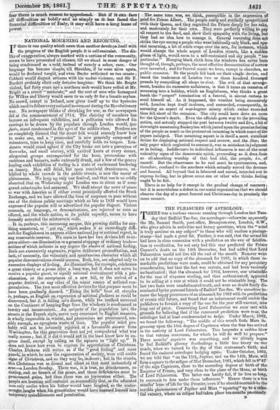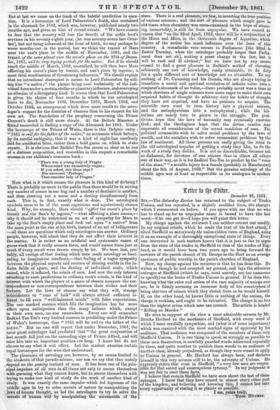THE PLEASURES OF ASTROLOGY.
TTHERE was a curious rumour running through London last Taa- 1 day that Zadkiel Tao-Sze, the astrologer—otherwise apparently the Mr. Samuel Smith, post-office, Brompton-row, London, S.W., who gives advice in nativities and horary questions, when the "mind is truly anxious on any subject" to those who will enclose a postage- stamp—had made a great hit. Further, it was said, that the actual hit had been in close connexion with a prediction on the eve of falsifica- tion or verification, for not only had this seer predicted the Prince Consort's death on the 11th December, but had added that Lord Pahnerston would not live till the end of the month. Rumour weht on to add that no copy of the almanack for 1361, in which these re- markable predictions were made, could be obtained for any pecuniary consideration, but that the fact was certain, and had been variously authenticated; that the almanack for 1862, however, was attainable for the sum of sixpence sterling, and thus authenticated, appeared to be selling at a rate at which it could not be attainable long. The last two facts were unadulterated truth, and were no doubt freely dis- seminated bythe personal friends of Zadkiel Tao-Sze. We ourselves be- came the happy possessors of an almanack for 1862 with its predictirins of events still future, and found that no inducement could enable the publishers to furnish a copy of the one for the year still current, iniw long out of print.. Concerning Lord Palmerston we soon met with grounds for believing that if the rumoured prediction were true, the astrologer had at least condescended to hedge. Under March, 1862, we found the following: "The middle of this month finds Mars ifi- gressing upon the 16th degree of Capricorn when the Sun has arrived in the nativity of Lord Palmerston. This bespeaks a sudden blow to that veteran statesman, for which he will do well to prepare." Three months' reprieve was something, and we already began to feel &alders gloomy forebodings a little less heavy on onr minds, when we turned to the day of that statesman's birth, and found the eminent astrologer hedging again. Under October, 1962, we are told that "on the 11th, Jupiter, and on the 14th, Mars, will form a square to the eclipse of 31st December, 1861, which fell in 9°57' of the sign Capricorn, close to the ascending degree at birth of the Emperor of France, and very close to the place of the Moon, at birth of Lord Palmerston. The latter can hardly fail, if he live so long, to succumb to fate under these influences." Hence there is a fen months' lease of life for the Premier,'even if he should sucetunb to the terrible phenomenon of Jupiter and Mars " squaring"' ttp to ti'delea' tial vacancy, where an eclipse had taken place teumontbs previonily.
But at last we came on the track of the baleful prediction in ques- tion. It is a horoscope of Lord Palmerston's death, also contained in the almanack for 1862, which was, however, published nearly two months ago, and gives no hint of recent events. "We have reason to fear that the country will lose the benefit of the noble lord's services in his seventy-eighth year, [he was seventy-seven last Octo- ber], but not being informed of the hour of birth, we may perhaps be some months out in the period, but we think the transit of Mars over the sun's place in the middle of November, 1861, and the transit of the same planet over the moon's place on the 27th of Decem- ber, 1861, will be very hying periods /or the native. Bat if he should reach the middle of March, 1862, unscathed, lie will then have Mars afflicting his moon's place by transit, and sun's place by ingress; a most fatal combination of threatening influences." We should explain that no intentional disrespect is meant to Lord Palmerston by call- ing him "a native ;" the phrase being used technically of the indi- vidual born ander a certain stellar or planetary influence, and conveying no allusion of a derogatory kind. It seems then that Lord Palmerston is given his choice of four months in which he has astrological leave to die, November 1861, December 1861, March 186e, and October 1862, an arrangement which does more Credit to the astro- loger's respect for the doctrine of chances than to his respect for his own art. The foundation of the prophecy concerning the Prince Consort's death is still more cloudy. At the British Museum a friend succeeded in finding a copy of the Almanack for 1861. Under the horoscope of the Prince of Wales, there is this Delphic entry : "1861 is evil for the father of the native," an utterance which betrays, by its careful ambiguity, that it was a kind of night-line carelessly laid for accidental bites, rather than a bold guess on which to stake repute. It is obvious that Zadkiel Tao-Sze steers as clear as he can of a distinct proposition, and resembles in this respect a remarkable woman in our children's nonsense book:
"There was a young lady of Prague Whose mind was excessively vague ; If you asked, Are these caps ? She answered 'Perhaps,'
That omcular lady of Prague."
Now what is it which causes the pleasure in this kind of divining? There is probably no more to the public than there would be in mixing any number of names in one bag and a number of destinies in another, fue t,hen .elrawing out a name and a destiny simultaneously from each. This is, in fact, exactly what is done. The astrological symbols seem to be of the most capricious and mysteriously chosen kind. Why, for example, Mars should "afflict the moon's place by transit and the Sun's by ingress,"—what afflicting a place means,— why it should not be construed as an act of sympathy for Mars to take up the Sun's empty place and look out upon a native" from the same point as the sun at his birth, instead of an act of belligerence —all these are questions which only astrologers can answer. Ordinary people, however, will admit that they do not affect their interest in the matter. It is rather as an artificial and systematic canon of guess work that it really amuses them, and would amuse them just as much if every result were drawn simply by lot. We have lost, pro! bably, all vestige of that feeling which once made astrology so fasci- nating to imaginative intellects,—that feeling of a vague sympathy between the physical aspects and courses of shining worlds in the in- finite fields of space, and the destiny of individual souls, which raised, while it inflated, the minds of men. And now the only interest attaching to such predictions in ordinary men's minds, is the kind of interest with which the players at a game of chance compare the cor- respondence or non-correspondence between their wishes and their
fortune. Let the laws of chance say what they will, strange coincidences or "runs of luck" will always attract sufficient in- terest to fill even "well-balanced minds" with false expectations. The one marked success which fills the imagination has far more effect upon anticipation than the many failures which, except in their own case, no one remembers. Every one will remember Zadkiel Tao-Tze's very limited success in predicting under the Prince of Wales's horoscope, that "1861 will be evil to the father of the native." But no one will report that under November, 1861, the same great astrologer had predicted that "the great conjunction of last month fell just on the ascending sign of Prince Alfred, and will raise him into an important position ere long. I know but do not choose to say what it will effect. Let the student examine certain royal horoscopes for the wise that understand.
The pleasures of astrology are, however, by no means limited to the students of that pseudo-science, nor can we say that they mainly depend on the gaming instinct of man. It has been one of the prin- cipal impulses of all men in all times not only to amuse themselves with guessing what they cannot know, but to amuse themselves with trying to make one kind of study do the work of another kind of study. It was exactly the same impulse which led logicians of the middle ages to try to solve secrets of nature by manipulating the laws of human thought, as led the astrologers to try to solve the secrets of human will by manipulating the movements of the
stars. There is a real pleasure, we fear, in inverting the true position of various sciences; and the sort of pleasure which magic gave in old times when chemistry was cross-examined in the hope of attain- ing immortality, is still far from unpopular. We have ceased to reason that "on the 22nd April, 1862, there will be a conjunction of the Moon and Mars, in the thirteenth degree of Aquarius, which degree of the zodiac has much influence over the laws of this country. A remarkable vote occurs in Parliament [the 22nd is Easter Tuesday, when the astrologer probably forgot that Pasha. ment does not sit], making a great change in the law, but it will be rash and ill advised;" but we have not by any means ceased to find a great pleasure in Zadldel's method of choosing arbitrarily one sort of knowledge, easily attainable, to do duty for a quite different sort of knowledge not so attainable. To say nothing of Dr. Cumming and his friends, who are always trying to transform a moral and spiritual revelation of infinite value into a conjuror's almanac& of no value,—there probably never was a time in which devotees of single sciences were more eager to make their own acquired habits of thought do arbitrary duty for habits of thought they have not acquired, and have no patience to acquire. The scientific men want to turn history into a physical science, and the metaphysicians into a metaphysical ; while the his- torians are nearly torn to pieces in the -struggle. The posi- tivists hope that the laws of humanity may eventually exorcise God; and the theologians hope that the divine oracles may supersede all consideration of the actual condition of man. The political economists wish to solve social problems by the laws of wealth, and the socialists wish to solve economical problems by the law of sentiment. All these persons are really giving the reins to the old astrological impulse of getting a study they like, to do the work of a study they dislike. It is not so discreditable, because not so dishonest, for devotees of one science thus to elbow all, others out of their way, as it is for Zadkiel Tao-Tze to predict by the "voice of the stars," "a notable injury to a female (probably in Manchester) about the 9th of August, 1862." But the genuine astrology of the middle ages was at least as respectable as its analogues 'in modern times.





























 Previous page
Previous page